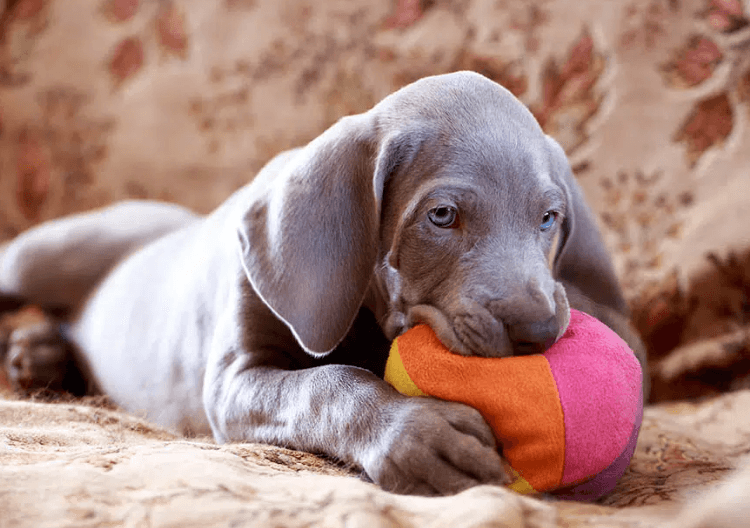
Why Do Dogs Love Stuffed Toys? 5 Vet-Reviewed Reasons (From Chewing Instincts to Separation Anxiety Relief)
Ever wonder why your dog treats their stuffed squirrel like a prized treasure? Turns out, those floppy toys aren’t just cute accessories—they’re fulfilling deep-rooted instincts and emotional needs. Let’s unpack the science and psychology behind your pup’s plush obsession! 🐾

1. “This Feels Amazing on My Gums!” – Chewing Instincts
Puppies aren’t the only ones who crave chew time! Stuffed toys act as portable gum massagers, soothing teething discomfort in puppies and satisfying adult dogs’ natural urge to gnaw. The soft texture mimics prey flesh (think: ancestral rabbit-chomping vibes), while the repetitive motion releases calming endorphins.
Pro tip: Swap shredded toys for rubber-free dental chews if your dog’s a heavy destroyer.
2. “I’m a Mighty Hunter!” – Prey Drive in Action
That growling, thrashing, and “killing” of stuffed ducks? It’s not random violence—it’s your dog’s inner wolf shouting, “Look, Mom! I caught dinner!” Breeds like Terriers and Retrievers especially love “hunting” plushies to practice skills their ancestors used to survive.
Fun fact: Carrying toys around mimics wolves transporting prey back to the pack.
3. “This Is MINE” – Possessive Pride
Dogs are natural hoarders. Stuffed toys become security blankets—objects they can “own,” hide under beds, or parade like trophies. This behavior stems from territorial instincts (ever seen a dog mark their toy with a cheek rub?).
Watch out: Resource guarding can turn ugly. Teach “drop it” commands early.
4. “I’m Bored… Let’s Party!” – Mental Stimulation
A bored dog is a destructive dog. Plush toys become interactive puzzles when stuffed with treats or frozen peanut butter. The challenge keeps brains sharp and prevents couch-eating marathons.
DIY hack: Turn old socks into treat-stuffed “prey” for budget-friendly fun.
5. “Don’t Leave Me 😢” – Separation Anxiety Relief
That teddy bear isn’t just fluff—it’s a furry therapist. Dogs with separation anxiety often snuggle toys infused with their owner’s scent (try sleeping with the toy first!). The familiarity reduces stress hormones by up to 40% during alone time.
Science-backed: Studies show dogs with comfort objects bark less and relax faster when left alone.

Safety First: When Stuffed Toys Turn Risky
Not all plush love is healthy! Red flags include:
• Swallowing stuffing: Causes intestinal blockages (symptoms: vomiting, lethargy).
• Aggressive guarding: Snapping when toys are touched.
• Toxic materials: Avoid toys with PVC or formaldehyde.
Vet-approved picks: Opt for hypoallergenic, double-stitched toys labeled “indestructible” (spoiler: nothing’s truly indestructible!).
Alternatives for Serial Shredders
If your dog’s a plushie serial killer, try:
• Rope toys: Satisfies chewing and flossing needs.
• Crinkle toys: Mimics prey sounds without the stuffing.
• Kong Classics: Stuff with yogurt and freeze for hours of distraction.
Final Thought: Stuffed toys aren’t just playthings—they’re emotional lifelines and instinct outlets for dogs. By understanding the “why” behind the obsession, you can choose safer options and even bond deeper with your furry best friend. Now, go toss that slobbery unicorn one more time—it’s basically therapy! 🦄💕
(P.S. Always supervise playtime and consult your vet if your dog shows signs of toy-related stress or allergies.)
American Dingo animal behavior Budget Tips canine behavior Canine Care Canine Health DIY pet projects dog behavior Dog Breeds dog care Dog Care Tips dog exercise Dog Food Dog Grooming dog health Dog Measurement dog nutrition dog ownership dog potty area Dog Training Dog Wound Care Family Pets Hunting Dogs lipomas in dogs newborn puppy care obedience training outdoor pet care Pet Care Pet Care Tips Pet Health Pet Loss Pet Safety pet tips pet training Positive Reinforcement Potty Training Puppy Care puppy health Puppy Training Rabies in Dogs Temperature Monitoring Training Tips veterinary advice Veterinary Care Veterinary Tips
-
 Why Is My Dog Barking at Trees? 2025 Vet-Backed Fixes to Silence the Chaos
2 views
Why Is My Dog Barking at Trees? 2025 Vet-Backed Fixes to Silence the Chaos
2 views -
 How to Train a Saint Bernard Puppy
2 views
How to Train a Saint Bernard Puppy
2 views -
 Top 10 Famous Dogs in the World The Three Stooges of Sledding and Housebreaking Make the List
2 views
Top 10 Famous Dogs in the World The Three Stooges of Sledding and Housebreaking Make the List
2 views -
 Understanding the Costs of Training a Dog to Behave
1 view
Understanding the Costs of Training a Dog to Behave
1 view -
 How to Tell If Your Dog Has a Broken Bone
1 view
How to Tell If Your Dog Has a Broken Bone
1 view -
 Do Dogs’ Ears Pop on Planes? 2025 Vet-Approved Tips to Keep Them Calm & Safe
1 view
Do Dogs’ Ears Pop on Planes? 2025 Vet-Approved Tips to Keep Them Calm & Safe
1 view -
 10 Vet-Approved Dog Foods for Liver Disease 2025: Clinically Proven Picks + Buyer’s Guide
1 view
10 Vet-Approved Dog Foods for Liver Disease 2025: Clinically Proven Picks + Buyer’s Guide
1 view -
 How to Care for an Australian Cattle Dog
1 view
How to Care for an Australian Cattle Dog
1 view -
 Cultivate the habit of brushing teeth
1 view
Cultivate the habit of brushing teeth
1 view -
 Vacuum Phobia Fix: Desensitizing Noise-Sensitive Dogs
1 view
Vacuum Phobia Fix: Desensitizing Noise-Sensitive Dogs
1 view










Leave a Reply
You must be logged in to post a comment.